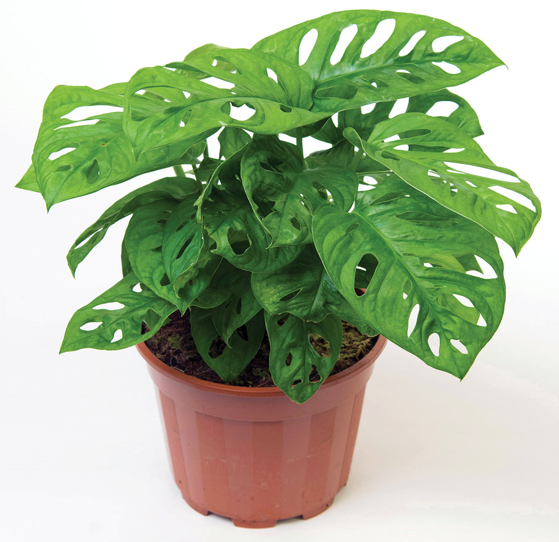Monstera adansonii, commonly known as the Swiss cheese vine or monkey mask, is a popular houseplant known for its unique leaf shape and striking fenestrations. Here’s a detailed overview:
Description
- Leaves: Monstera adansonii features heart-shaped leaves with distinctive holes and slits, which develop as the plant matures. The leaves are smaller than those of Monstera deliciosa, typically growing up to 12 inches (30 cm) long.
- Growth Habit: This plant is a vining species that can grow several feet long, making it ideal for hanging baskets or training on a trellis or moss pole.
Care Tips
- Light: Monstera adansonii thrives in bright, indirect light. It can tolerate lower light conditions but may produce fewer fenestrated leaves. Avoid direct sunlight, which can scorch the foliage.
- Watering: Water when the top inch of soil feels dry. This plant prefers to be kept moderately moist but is susceptible to root rot, so ensure good drainage and avoid letting it sit in water.
- Humidity: This plant enjoys higher humidity levels, ideally around 60% or more. If your home is dry, consider misting the leaves or using a humidity tray to increase moisture.
- Temperature: Ideal temperatures range from 65-85°F (18-29°C). Protect the plant from cold drafts and sudden temperature changes.
Potting and Soil
- Medium: Use a well-draining potting mix that retains some moisture. A blend of potting soil, perlite, and orchid bark is effective.
- Repotting: Repot every 1-2 years or when the plant becomes root-bound, typically in the spring.
Fertilization
- Schedule: Fertilize with a balanced, water-soluble fertilizer every 4-6 weeks during the growing season (spring and summer). Reduce feeding in the fall and winter when growth slows.
- Dilution: Always dilute the fertilizer to half-strength to prevent over-fertilization.
Pests and Problems
- Common Pests: Monstera adansonii can be susceptible to pests like spider mites, mealybugs, and aphids. Regularly check the leaves and treat any infestations promptly with insecticidal soap or neem oil.
- Leaf Issues: Yellowing leaves can indicate overwatering or poor light conditions, while browning tips may suggest underwatering or low humidity. Proper care will help prevent these issues.
Toxicity
Monstera adansonii is mildly toxic to pets and humans if ingested, potentially causing irritation and gastrointestinal upset. It’s best to keep it out of reach of curious pets and young children.
have a look at our indoor plant collectionhttps://mfourgreen.com/product-category/indoor-plants/

Reviews
There are no reviews yet.